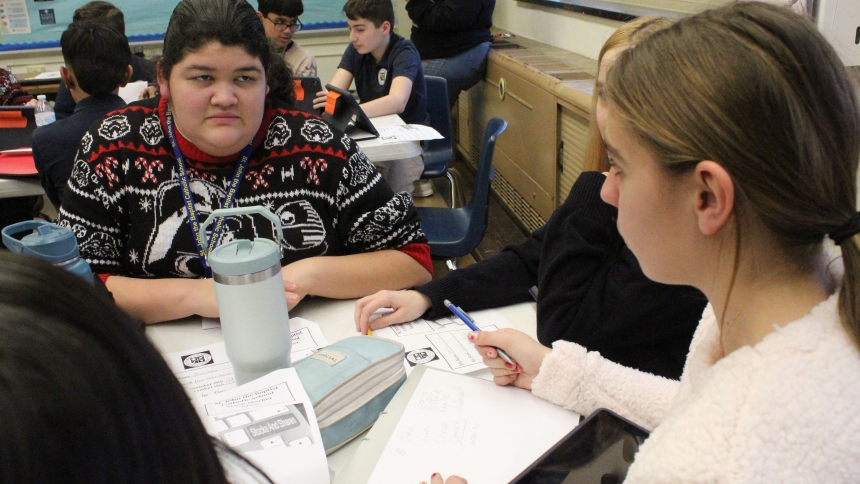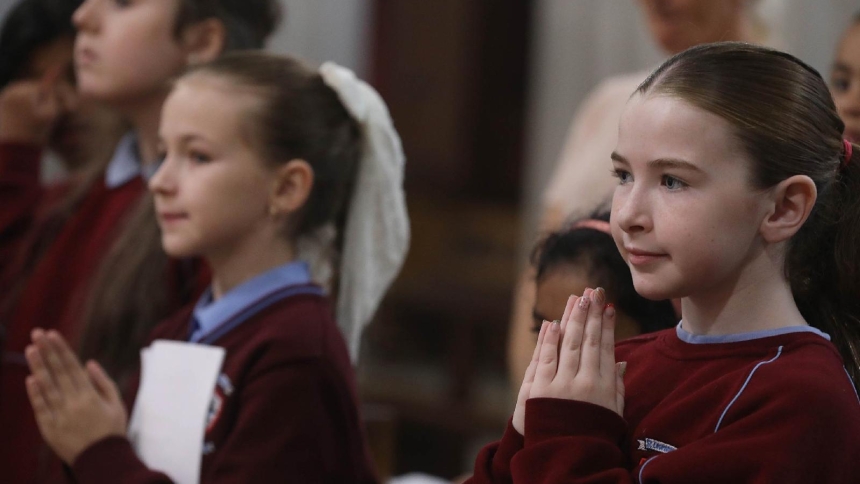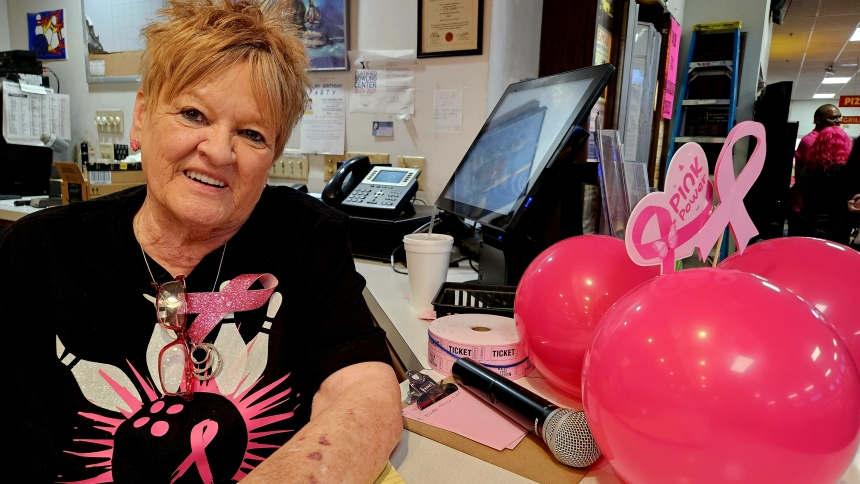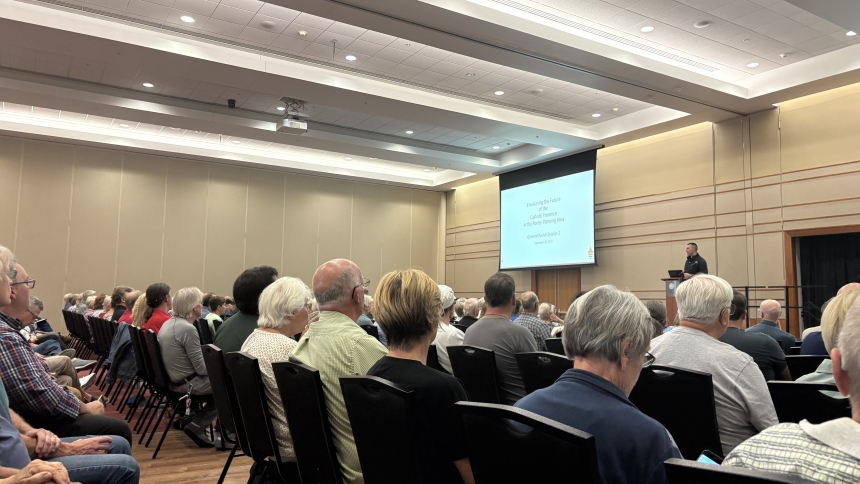
WHITING – Don’t be surprised if your new financial adviser 10 years down the road is a graduate of one of the Diocese of Gary elementary schools.
That’s because more than 50 eighth graders at St. John the Baptist School in Whiting, St. Mary Catholic Community School in Crown Point and Notre Dame School in Michigan City are learning about investing and financial markets in a unique, mock hands-on program where classes get $3,000 to invest and try to beat the market. They’ll earn a 2% management fee for their work and the chance to win prizes while competing with other students across the three schools.
“This is the first year for this program in Northwest Indiana schools, and we hope to expand in future years,” said Dan Kozlowski, executive director of Big Shoulders Fund NWI, as he observed a class at St. John the Baptist on Dec. 18. “It teaches the kids about financial markets for personal wealth and how the stock market reflects daily life.”
The program is modeled after the Big Shoulders Fund Stock Market Program in Chicago, which began 16 years ago and is now taught to more than 1,000 youngsters in 61 Big Shoulders Fund network schools.
At each school, the classrooms chose four stocks in which to invest their pool of $3,000, as well as one personal stock to track. Each week through April, they will learn about different aspects of investing and check the progress of their stocks and the classroom stocks, which can be bought and sold as the semester advances.
“You’re competing against each other and against the other schools,” Kozlowski told the students. Classes whose portfolios grow the most will win cash prizes and whichever individual student has the stock that grows the most will receive an iPad or Kindle Fire.
The classes are taught by volunteer financial services professionals, who teach students about investing and saving, as well as about careers in finance. Sharing their expertise at SJB are Dr. Amy McCormack, president of Calumet College of St. Joseph, whose background is in finance, and Jesse Hunt, NWI market president and director of Commercial Lending at Notre Dame Federal Credit Union.
Both are members of the Founder’s Advisory Council for Big Shoulders Fund NWI.
“We are building a volunteer corps, and I believe it’s important to have female representation,” said McCormack of her participation.
“We are developing the future members of our credit union,” added Hunt with a smile. “Part of our company’s mission is to give back, and what better way than to give these kids a little financial advice, advice that I never got. We hope to plant the seed for future-wise investing.”
The theme of the Dec. 18 class, the fourth in the series, was “Diversification,” and included a review of the performance of the classroom stocks – Johnson & Johnson, Visa, Chase and Spotify – two of which had risen in the past month and two of which had declined, as well as a short video on how to manage risk by carrying a diversified portfolio.
Ideally, the students learned, that you want your investments to be “negatively countervalued,” so that when one category dips, another rises in value, keeping a portfolio stable.
“You could take your $3,000 and hide it under the mattress and you won’t lose anything, but you won’t earn anything either, and you will lose value as time goes on,” said McCormack. “You could also invest in CDs and you’ll know what you are going to earn, so you don’t have to look at that investment.
“A group of investors with a large amount to invest may put their money together to build a sports stadium, but that will take a long time to build and more of a long-term risk; you won’t know if the team will do well and you will earn a good return.”
As you get closer to retirement,” McCormack further advised, “you don’t want to take too much risk because if you lose money, that is money you need to live on after you no longer have an income.”
The eighth graders researched companies and used their knowledge as consumers to choose their personal stocks. John Ruvalcuba selected Netflix, a streaming video service, “because they are coming out with a lot of new shows in 2025, and during the holidays people watch a lot of TV and movies, buying new subscriptions.”
His instincts paid off in the first month as Netflix stock rose 72 points.
“It is awesome that these students get to experience the financial aspects of the economy, learn how to invest in stocks and how to make positive choices,” said SJB middle school teacher Andrea Murillo.
“There are a lot of different industries to invest in,” noted Hunt of diversification. “You don’t want to put all your funds in the automotive industry, for instance, because if auto manufacturing goes down, you could lose everything.”
After gathering in small groups to analyze their class stocks in terms of diversification, they chose to “sell” one of their two financial stocks, Chase, and invest in NBCC, an India-based construction company suggested by student Lillian Wanek. “It looks like a good risk, and gives us a stock from another country,” she explained.
“I think it’s great that we’re teaching our kids at this age something that they can use their whole life, something that relates to the digital world we live in and employs technology,” said Michelle Ondas, SJB principal.
Caption: Eighth graders Olivia Vega and Lillian Wanek discuss the recent performance of the four stocks their classroom chose to 'buy' at the start of the Stock Market Program at Big Shoulder Schools in Northwest Indiana during a class on Dec. 18. Wanek proposed divesting of the Chase stock and adding a foreign stock to provide more diversification, and the class agreed. The program will extend through April. (Marlene A. Zloza photo)



